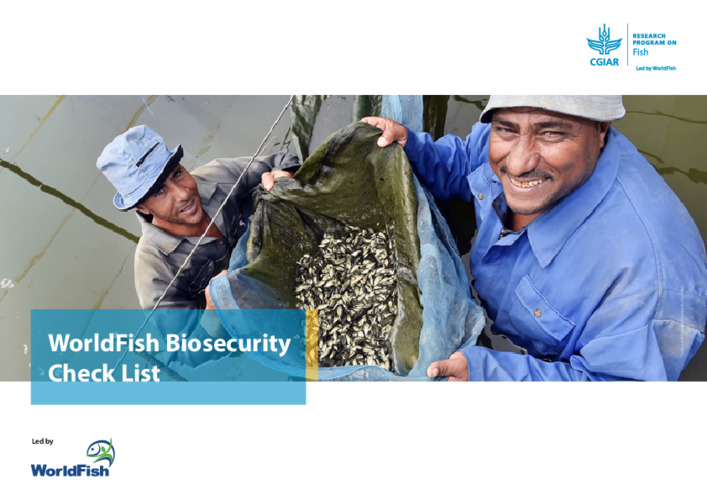WorldFish Biosecurity Checklist

Diseases are a threat to aquaculture production and profitability. Biosecurity is the establishment and implementation of a system of procedures to prevent the introduction of pathogens into a fish facility from outside the facility or into a section of the facility from another section in the same facility. Biosecurity consists of various, simple, sometimes zero-cost measures that will keep pathogens away from fish and keep fish away from pathogens. The movement of live aquatic animals has been responsible for the international spread of many serious fish diseases, often with devastating impacts on aquaculture. The genetically improved farmed tilapia (GIFT) is the flagship product of WorldFish. GIFT seeds are disseminated to farmers through a network of satellite breeding programs, multiplication centers and hatcheries. WorldFish is committed to promoting sound biosecurity in core breeding programs, satellite breeding facilities, multiplication centers, hatcheries, and farms.
The purpose of this check list is to guide facility owners in the public and private sectors to: (1) undertake audits in a very systematic and structured way, (2) identify the gaps and constraints, (3) prioritise risks depending on the functional importance of the facility, and then (4) make practical and cost-effective decisions on interventions and investments to improve the biosecurity for their facility.
Audit findings from a particular facility could be used to develop site specific SOPs and manuals. Undertaking self-audits and
interventions for improvements will greatly enhance the ability of breeding programs, multiplication centers and hatcheries to supply pathogen free healthy stock (i.e. quality germ plasms, brood stocks, and seeds) to the tilapia industry.
The audit check list was developed by the CGIAR Research Program on Fish Agri-Food Systems (FISH) led by WorldFish. It was
produced as part of the WorldFish better management practice (BMP) resources to support sustainable and responsible tilapia
farming. The check list draws from information found in the public domain (ref 1; ref 2) as well as WorldFish’s own experiences and learnings from auditing its own breeding platforms in Malaysia, Egypt, Bangladesh and Myanmar.
Permalink
Date Available
Type
Copyright
CC-BY-NC-4.0
Research Themes
Topics
Language